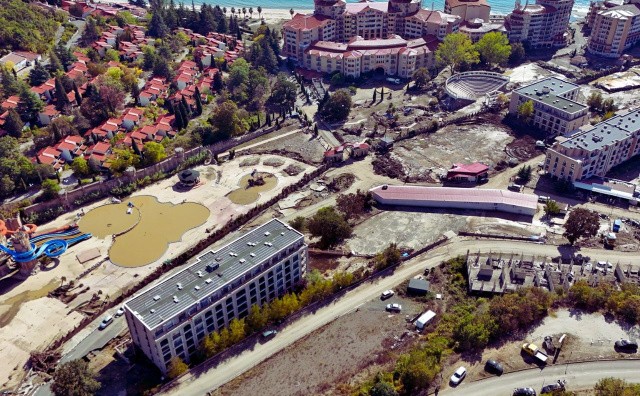The Bulgarian resort of Elenite has been left covered in mud and debris following the devastating flood that claimed four lives earlier this month. Streets are buried under layers of silt, pools are filled with mud, and parts of the infrastructure have been heavily damaged, as seen in footage captured by a BTA drone. The aftermath paints a grim picture of destruction, with uprooted trees, collapsed structures, and sections of asphalt torn apart by the force of the water.
The victims of the disaster include a foreign tourist who was trapped in an underground hotel room, unaware of the imminent danger, and an excavator operator who lost his life while participating in the rescue operation after being swept away by the surge. Another victim was border police officer Stefan Ivanov, a veteran and chief boatswain of the vessel Balchik. The fourth victim was a 58-year-old Russian national whose body was discovered in a remote villa cut off by the floodwaters.
Prime Minister Rosen Zhelyazkov visited the devastated area to inspect the damage and assess the ongoing recovery efforts. According to a statement from the Council of Ministers, a technical team from the State Enterprise “Dams and Cascades” under the National Electric Company (NEC) will examine the river correction system in the Elenite resort to determine whether it contributed to the flooding.
Due to contamination of the local water supply, the government announced that 60,000 liters of drinking water from the state reserve will be distributed to residents of Sveti Vlas and Elenite. The cleanup operation is continuing with the help of heavy machinery, including excavators, cranes, dump trucks, and all-terrain vehicles, as well as manual labor teams working to remove mud, fallen trees, debris, and damaged vehicles from the area.
Regional Governor Vladimir Krumov has also requested additional assistance from the Ministry of Defense to provide manpower and equipment for the recovery work.
Prime Minister Zhelyazkov stated that the Elenite disaster may be brought before the courts, stressing that the tragedy is the result of multiple factors, including excessive human intervention in natural areas. “Nature has shown once again that it will always prevail where people have disrupted the balance,” he said, adding that authorities are now reviewing urban planning, construction regulations, and environmental management to prevent similar disasters.
Zhelyazkov emphasized that the early warning system had functioned effectively, helping to save many lives. He also noted the timely decision to suspend traffic near the resort, which, according to him, prevented even greater casualties when the floodwaters hit.

